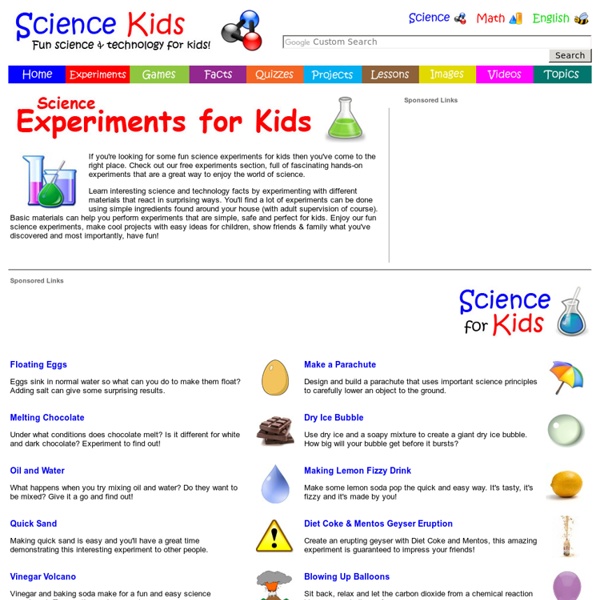Albert Einstein Facts, Quotes, Relativity Theory, Science Information
Albert Einstein was born on the 14th of March 1879 and died on the 18th of April 1955. Born in Germany to a Jewish family, Einstein made many contributions to the field of theoretical physics. Even when very young, Einstein showed great ability in both math’s and science. He was naturally curious and had a brilliant analytical mind. Einstein worked in a patent office evaluating patents for electromagnetic devices not long after he graduated. He produced perhaps one of the most famous equations ever: E = mc² (energy equals mass multiplied by the speed of light squared).
science - Edventures with Kids
We are gearing up for some science fun with this week's Discover & Explore linky. I love introducing hands-on science activities to kids so that they can experiment, think and ponder all those wonderful questions they love to ask to stump their parents ;) There are a number of easy ways to learn with science -- many of them arise from the questions the kids have about things they see happening in the world around them.
Use these resources to bring augmented reality to your classroom
The use of augmented reality in classrooms is growing, as more educators discover this affordable option for bringing a new dimension to the printed page — and to physical objects — in a way that can engage and motivate learners. Unlike virtual reality (VR), where users look through viewers to experience 3D, 360-degree videos and still images, augmented reality, or AR, comes in several forms. AR can involve overlaying computer-generated images onto live video.
Welcome to Virtual Incredible Science!
The activities you find on this website have been created by each of our schools and departments: The School of Biological SciencesThe School of Chemical SciencesThe Department of Computer ScienceThe School of EnvironmentThe Institute of Marine ScienceThe Department of MathematicsThe Department of PhysicsThe School of PsychologyThe Department of Sport and Exercise ScienceThe Department of Statistics Having so many schools and departments doing amazing scientific research means it is easy to show you one of the coolest things about science – it is everywhere!
Ecosystems for Kids - Science Games and Videos
Ecosystems for Kids An ecosystem is a community of living and non-living things that function together. Within an ecosystem, organisms are interdependent and adapted to the environment. Ecosystems can be as large as a desert or a sea or as small as a tree or a pond. Examples of ecosystems are coral reefs, rainforests, deep seas, deserts, tundra, savanna and urban centers like our cities.
Kids - Albert Einstein Biography
Albert Einstein was born as the first child of the Jewish couple Hermann and Pauline Einstein, nee Koch, in Ulm on March 14, 1879. When Albert’s grandmother saw him for the first time she is said to have cried continuously: "Much too thick! Much too thick!" But despite all fear the development of young Albert was a normal one.
Activity: Create a noisemaker - Learning Activities
By Dr. Fred Stein, Consulting Educator This activity reinforces the skills of observation, asking questions and experimentation. Our science consultant Fred Stein explains that at the first-grade level, students are able to ask "What will happen if…" questions. "These kinds of questions lead to exploring and experimenting. By asking and finding out what happens when changing the size or material of their laughing cups, or the way that they pull their string, they reinforce the idea of cause and effect, which is the basis for understanding variables."
Squeeze-Bottle Straw Rockets - The Lab
It’s easy to turn a juice bottle into a rocket launcher. How? Grab a few straws, some modeling clay, and an empty juice bottle to make a launcher that will send the straw rocket soaring across the room. Okay, you’ll learn something about Newton’s Laws of Motion at the same time.
15 Science Experiments You Can Do With Your Kids
by Therese Oneill Time to get messy, light some stuff on fire, and use food products in ways they were never intended! Parents and teachers across the internet have found fun ways to teach kids science, and have documented the experiments for the rest of us. Here are 15 hands-on science lessons that will stick in a kid’s brain far longer than anything they get from a textbook.
Lawrence Hall of Science - 24/7 Science
Welcome to Twenty Four Seven Science! Activity Collections View All



